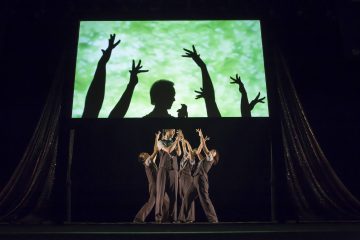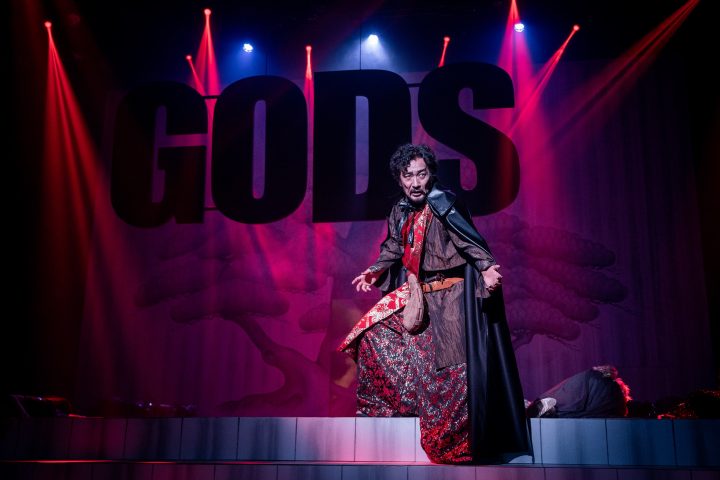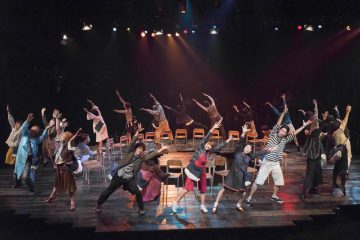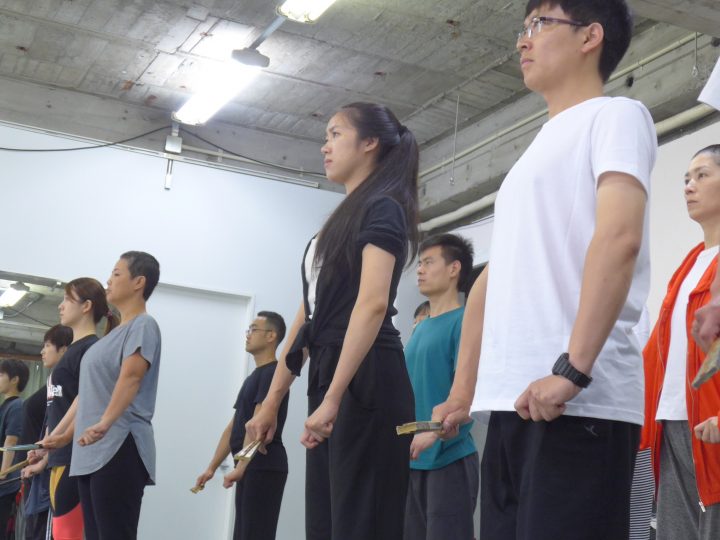"Shaggy Head and Crazy Glasses: Local Drama Musical, Yokohama, Japan, Ohama-sama"
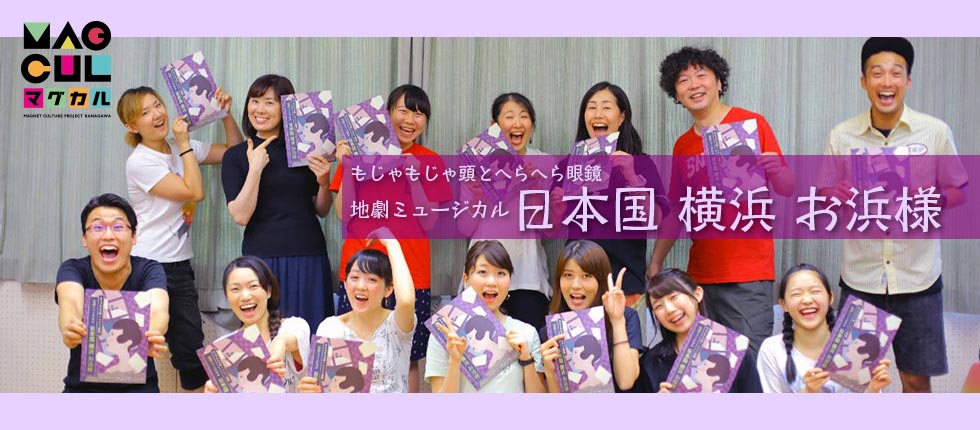
"Geographical Musical Japan Yokohama Ohama-sama"
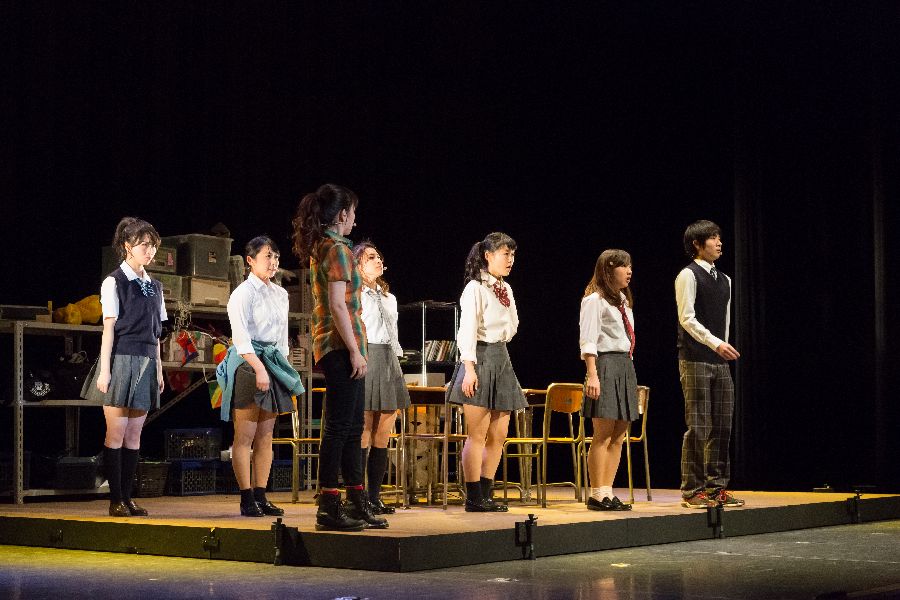
The drama club of Honmoku Jyuniten High School attempts to perform a script called "Nihonkoku Yokohama Ohama-sama" at the school festival, which is based on a real "chabuya" (a dance hall on the first floor and a lodging for sexual intercourse on the second floor) that once existed in Honmoku, Yokohama, and the legendary star "Meriken Ohama". However, the adults object, saying that "it is not appropriate for the school's spirit for high school students to act out a story about prostitutes". This completely original musical is set in a modern high school drama club and revolves around real people and places, while also involving conflicts over "sex" and "female independence".
August 12th (Sat) 14:00~/18:30~, August 13th (Sun) 12:00~/16:00~
*The afternoon show on the 12th will feature an after-talk event, while the other shows will feature a mini review show.
Venue: Kanagawa Prefectural Youth Center Hall (nearest stations: Sakuragicho Station, Hinodecho Station)
¥4000 General admission, ¥2000 University students, vocational school students, theater students, high school students and younger (+200 yen on the day)
Ticket Reservation
Confetti
http://confetti-web.com/mojahera
(24-hour reception available)
0120-240-540 *Toll free, operator response
(Reception hours: Weekdays 10:00-18:00)
Crowdfunding (Deadline: August 6th)
I want to show the local musical "Japan, Yokohama, Ohama-sama," which touches on the history of Honmoku, to students for free.
https://camp-fire.jp/projects/view/32103
*Elementary, junior high, and high school students, drama trainees, and university students who live and study in the prefecture can attend the show for free.
◇The environment is the same in the modern world as it is in the Chubuya. It's interesting because there are people who clash with each other.◇
-Please tell us about your roles and what you find appealing about this performance.
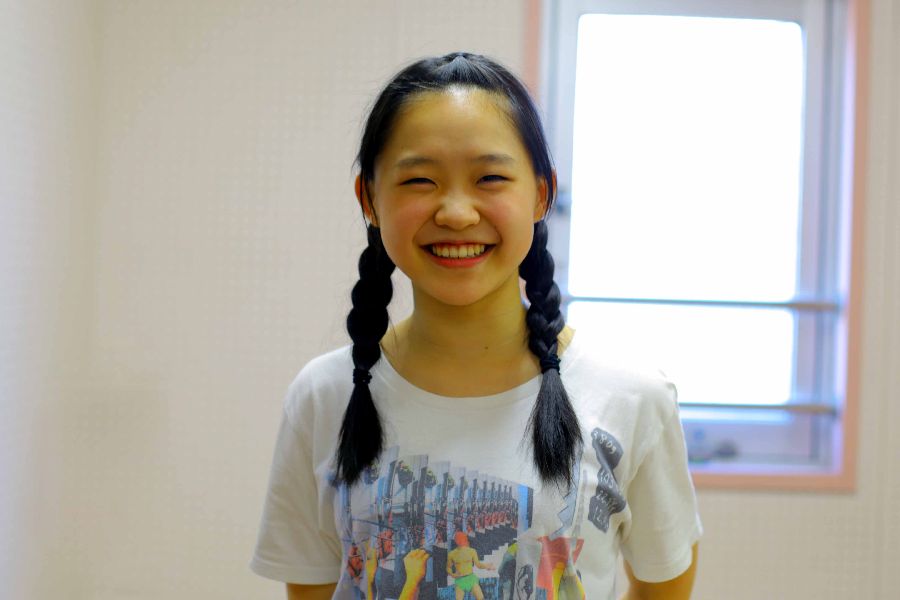
Moe Miyake plays the role of "Mika," a second-year student at Honmoku Jyuuniten High School.
Miyake: My name is Miyake Moe and I play the role of Mika, a second-year student at Honmoku Jūniten High School.
She plays a high school girl who is so competitive and strong-willed that the author calls her "Angry Twintails."
He hates lies and has a strong sense of justice, so if he thinks something is wrong he will speak out and confront the teacher directly.
・Miyake-san, you are a high school student. Are there really few students like that among high school students today?
Miyake-san: No! Everyone is a good kid on the surface, but behind the scenes they say nasty things to people or post things on social media. They never say anything back to you face to face. There are a lot of good kids. In this role, there are many scenes where I have to express anger, and when I get angry, I become childish, which is a problem. I'm currently looking for ways to express that anger in a way that doesn't become monotonous. In this performance, I would like you to see the scenes where we honestly express our opinions, and the dancing and singing of the main cast of Chubuya. The show is full of the fun that only a musical can offer, where the brilliance of the dance and the singing are intertwined.
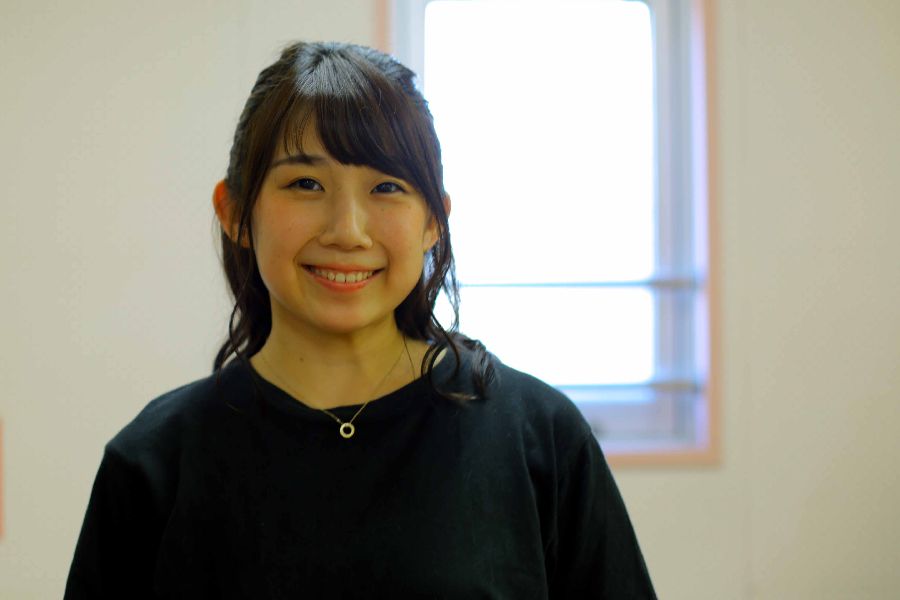
Waka Matsumoto plays Mika's classmate, "Rei," the vice-president of the drama club.
Matsumoto: I'm Matsumoto Waka, who plays Mika's classmate, Rei, the vice-president of the drama club.
I also speak out immediately if I think something is wrong, so we often clash, and I play a hot-blooded guy who knows how to bend. It reminds me of when I was an elementary school student, and there are many parts where I feel that I overlap with my old self while playing the role.
-Since there are many similarities between you and the character, is it easy for you to get into the role?
Matsumoto: It's hard to say it's easy to get into the role, since I have to expose the things I don't like about myself, and although we have things in common I don't want to admit. Also, the script has some parts that make us want to look away, that we don't want to say or see, so it's difficult. But even so, this musical is a real pleasure to sing, as well as dance. I'd like you to pay particular attention to the lyrics. The writer Kawada also wrote the lyrics, and they are so packed with things he wants to say and convey that in parts it almost feels like a rap. I want to sing well so that I can convey those packed-in feelings to the audience.
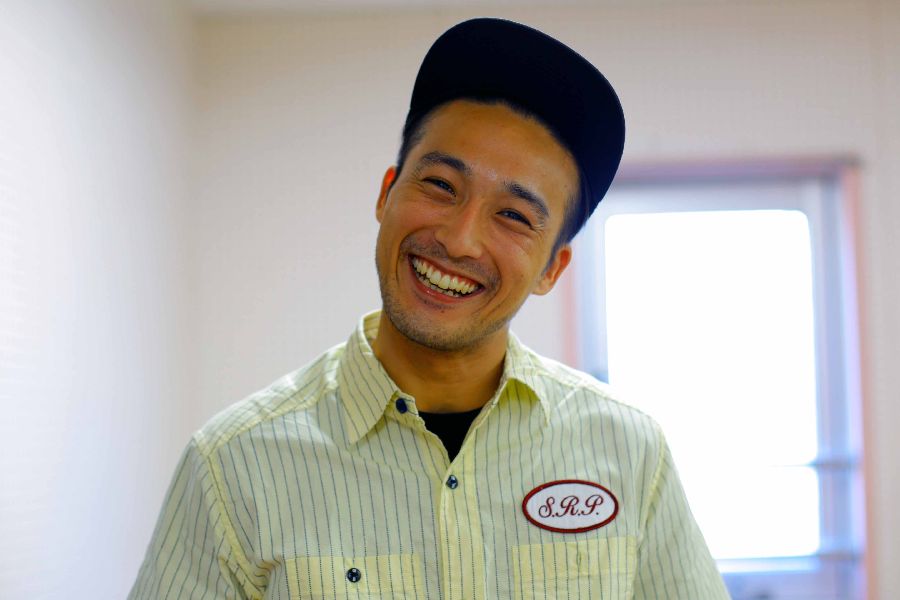
Atsuyuki Tanaka plays Jisaburo Kurata, the real person who created the Chubuya district in Honmoku
Tanaka: I'm Tanaka Atsuyuki, playing Kurata Jisaburo, a real person who created the Chubuya district in Honmoku, Yokohama.
This is my third time playing this role, and at first I thought he was a happy, easy-going businessman. However, as I played the role more and more, I realized that it wasn't that simple. There are adults who smile but don't have smiling eyes, right? I've now come to think that he must have had a dark side, like a politician.
- Was that something you were able to find out because you continued to do research for your role, such as walking around the former Chubuya district and meeting descendants of Mr. Kurata?
Tanaka: I think it's because I read a lot of materials from the time when Kurata was alive. He bought the land in Honmoku and made it his own empire, left a culture behind, and was a smart and charming person. I'm sure he was quite a person who killed people behind his smile. The appeal of the performance is that many people who are in conflict appear because of their honesty. The setting is Chabuya Street, but the environment is the same even in modern times. Chabuya Street is no longer there, but it is a fact that it was there. What is wrong and what do we need to leave behind? With the 2020 Tokyo Olympics and Paralympics attracting attention from abroad, I think it is important for us as Japanese people to leave behind history, even if such things actually happened. What will remain in your hearts after watching the performance? I also hope to make it a performance that will leave some meaning for children who will become adults in the future.
◇The reason I became a professional director was because of a Yokohama Civic Musical I saw when I was in high school.◇
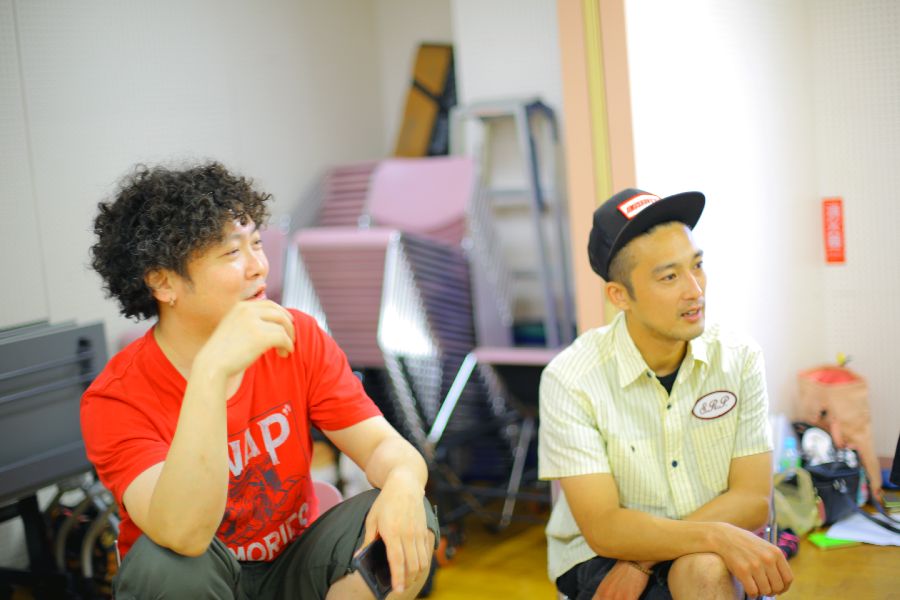
(Left: Director Sasaura-san. Right: Tanaka-san)
・A question for director Sasaura-san. In the performances based on Ukiyo Hotel so far, I feel there has been a consistent theme of female independence and sexuality.
Sasaura: The writer Kawada has always been dealing with women's independence, and although he says that employment opportunities for men and women have become equal, the ratio of women in executive and managerial positions is still low. Many of his works are based on themes such as the absurdity felt by women and their frustration with society.
・"Shaggy Head and Fluttering Glasses" is the name of a director and scriptwriter unit, not a theater company. Is there a reason why you don't have a theater company?
Sasaura: When you have a theater company with actors, there will inevitably be actors who don't fit the work you've written. I think it's better for both parties to find actors who are a perfect fit for the work you've written through auditions or to ask them each time. In this local drama musical, in addition to the 25 actors, we plan to have one guest perform each time.
・This is a rational way of thinking, but do your opinions ever clash?
Sasaura: Kawada spent his childhood in Switzerland, so he has an international sensibility, is strong-willed, and says what he wants to say. I also want to say what I think right away, so we often argue. But I think it's easier to work together if we can both say what we think. In the rehearsal room, the actors, and the staff all get along well, with an atmosphere where we can say what we want to say to each other.
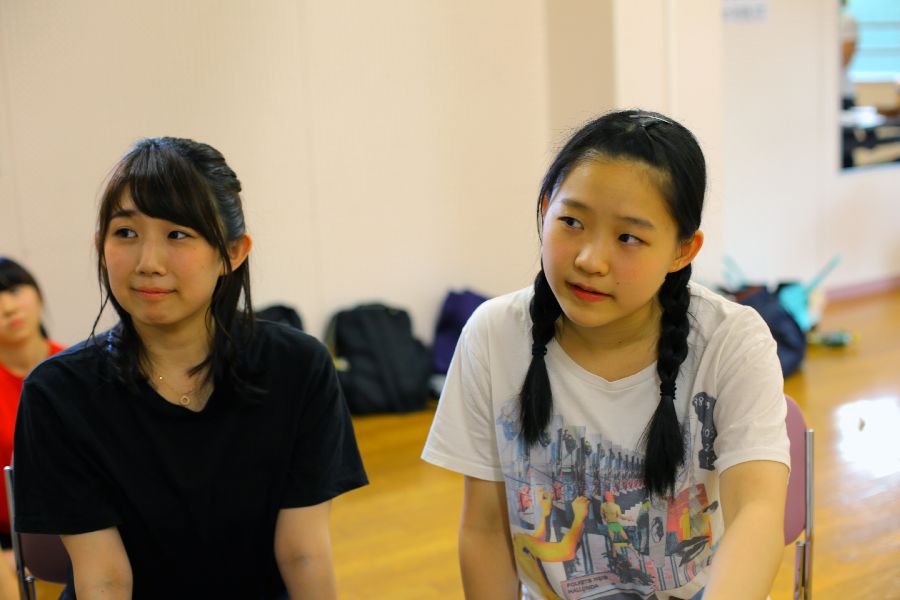
(Left: Matsumoto-san, right: Miyake-san)
・You've been involved in prefectural projects since the theater performance held at the prefectural office in 2014. Were you originally interested in theater rooted in the local community?
Sasaura: We are mainly active in Kanagawa Prefecture. We were originally doing local theater, but at the time, Governor Kuroiwa said about the Magcal concept at the "Dialogue Square" organized by the prefecture, "We can use the main hall as a theater." When Kawada heard that, he asked a general question, "If that's the case, how can we do a play here?" That's how it all started. After the discussion progressed concretely, we were actually going to do a play four months later, and I thought Kanagawa Prefecture was amazing at how fast it was.
-Please tell us what made you decide to become a director.
Sasaura: I didn't actually have any specific idea of what I wanted to do in theater. When I was in high school, I went to see a community-participation musical in Yokohama, and I remember thinking it was amazing. After entering university, I started participating in a community-participation musical called "Constitutional Drama." This was the trigger for me to learn various staff work, and I found that doing it on the spot was much more fun than what I was taught at university. I became so absorbed in it that I ended up dropping out because I couldn't stand the gap between the real thing and the real thing.
-So it was community musicals that led you to become a director, and now you're working on territorial musicals?
Sasaura: We were members who met through a community musical, and we planned a one-time performance, but it ended up being a huge profit. We thought, "This is bad. We have to keep going," and planned the next performance. However, after that, we hired proper professional staff and performed, and ended up in the red. I don't think there are many people who start out in community musicals and go professional, but I think that community-participation theater that anyone can participate in is important for the community. In the same way, there are Botchan Theater in Ehime Prefecture and Warabiza in Akita Prefecture, which are trying to revitalize the community through theater while being connected to the community, and I think it would be great to have an environment that looks beyond just performing, but also looks to the future and nurtures the people who have been exposed to theater.
・The Prefectural Youth Center is actually named the Magcal Theater. For this performance, they are trying crowdfunding for the first time (they had already achieved about half of their goal of 500,000 yen as of July 19th).
Sasaura: Yes. I'm taking on the challenge because I really want students to see it. We're performing with a mixture of lies and based on real objects, people, and culture in Honmoku, Yokohama. Prostitution and brothels are subjects that are rarely covered on television and other media, but by showing this in a play, children can learn about such culture and use it as a basis for thinking about what to do in the future. There are ways of expression that can only be conveyed through theater. I want people to be exposed to theater more in their daily lives, and in this performance, I want to send a message to the world, "Why can't we convey this through theater?" by putting it on dance and song as a musical.
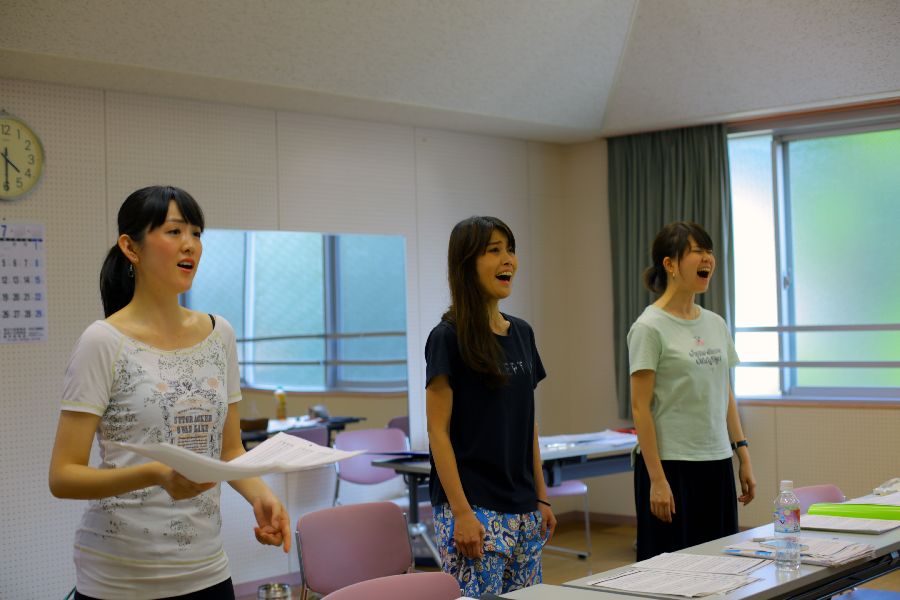
(From the left during singing practice: Kitamura Maki, who plays American Ohama, Yasujima Moe, who plays high school girl Nana, and Kiuchi Shiori, who plays the lead high school girl Saki)
Upcoming performances
"Punk Drunker"
October 20th (Friday) to 28th (Saturday) Lazona Kawasaki Plaza Sol
Screenplay: Shinichiro Midori (Theatrical production "Spiral Staircase")
Directed by: Nobuhiro Sasaura (Shaggy Head/Eel Project)
Tickets will be on sale from August 19th.
